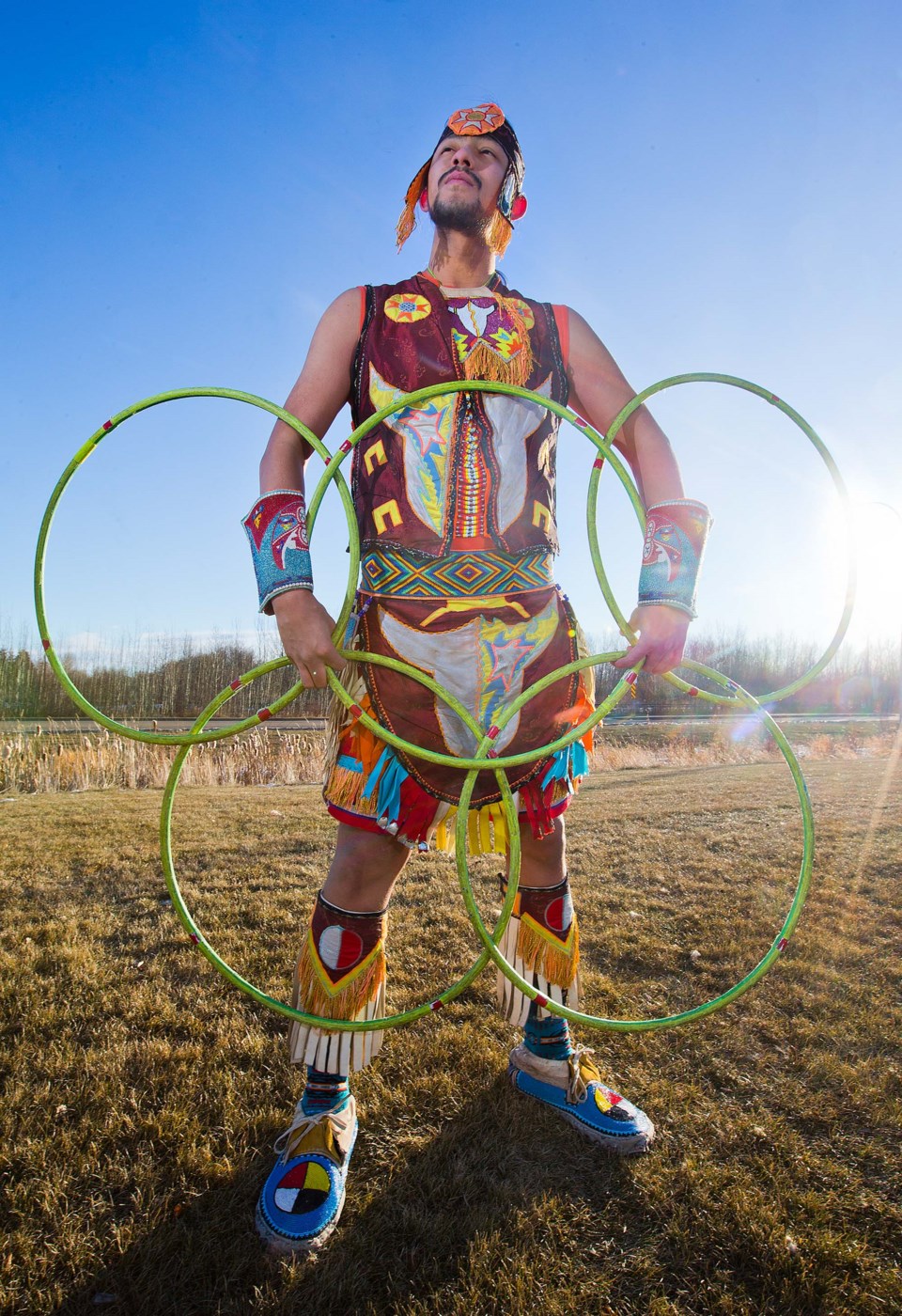Normally, Alexander First Nation artist Dallas Arcand Jr. would be zipping between Vancouver, Calgary, and Edmonton hoop-dancing later this month as part of Canada’s National Indigenous Peoples Day celebrations.
But that’s all changed this year because of the pandemic.
“Nobody’s hiring dancing Indians right now,” he quipped, and powwows and cultural events everywhere have been cancelled.
On the plus side, he said he’s had a lot more time to connect with friends and his community, and he’s seeing people pay more attention to racism in Canada as part of the Black Lives Matter protests.
“For Native people especially here in Canada, there’s a lot of racism that goes on.”
June 21 is National Indigenous Peoples Day in Canada. This June also marks one year since the final report of the National Inquiry into Missing and Murdered Indigenous Women and Girls and five years since the Truth and Reconciliation Commission released its 94 Calls to Action.
Celebration at a distance
St. Albert’s in-person Indigenous Day celebrations have been cancelled due to the pandemic, city spokesperson Cory Sinclair stated in an email. Mayor Cathy Heron would still read the Indigenous Peoples Day proclamation on June 15 in the Healing Garden, though. The Treaty 6 flag would fly at St. Albert Place from June 21 to 24, followed by the Métis flag from the 24th to 27th.
The St. Albert Public Library will have Indigenous-themed reading lists and video streams this month as part of Indigenous Day, said public services manager Stephanie Foremsky. The library’s book clubs are also all reading One Native Life by Richard Wagamese, which tells the story of the author’s life as an Ojibwe man growing up in a foster home.
Musée Heritage Museum program manager Sharon Morin said the museum had produced online videos on the Healing Garden and St. Albert’s Métis history. She would also take part in a free online forum June 10 on the Truth and Reconciliation Commission that would be broadcast on the Local Good Facebook page from 7 to 9 p.m.
Morin said many people have turned to social media to host virtual celebrations of Indigenous culture.
One example is the Social Distance Powwow Facebook site, which features clips of people performing Indigenous songs and dances across North America. Another is the June 13 Virtual Métis Fest. Organized by the Métis Nation of Alberta, this free event will feature musical acts, a jigging contest and prizes, and will be broadcast on the MNA’s Facebook page.
With the pandemic keeping many of us apart, it is more important than ever to connect with others through these online cultural events, said Hannah Nash, organizer of St. Albert’s Missing and Murdered Indigenous Women’s Walk (which has been delayed until this fall).
“Cultural events are usually what brings people together,” Nash said, and these online events give people that chance to connect.
Racism lives here
Nash said she was one of the roughly 10,000 people to attend the Fight for Equity anti-racism rally at the Alberta Legislature on June 5. While the rally’s main focus was on Black Canadians and the death of George Floyd in the U.S., Nash said there was also a lot of attention drawn to racism toward Indigenous people at the event.
“We’ve had a lot of people come forward with their stories saying they would rather be a black person in Canada than an Indigenous person in Canada because they would be treated better,” she said.
Canada has a centuries-long legacy of discrimination towards Indigenous people visible in the residential schools, the Sixties Scoop and the disproportionate number of Indigenous women who go missing or are killed.
Arcand said he remembers how security guards would shadow him and his friends whenever they went to the Edmonton City Centre Mall as youths simply because of the colour of their skin.
“I’d walk into a store and (the staff) would be staring at me ... waiting for me to leave.”
Arcand said the experience made him angry at the world, and said his life only got back on track when he had a spiritual awakening later in life.
Many people don’t realize there are still survivors of residential schools around today, said residential school survivor and St. Albert resident Hazel McKennitt. The schools also have intergenerational impacts, as the students in them left with no knowledge of how to be proper parents.
“I just heard Michelle Obama speak and say that we’re all human, we all come from the same source,” McKennitt said – an idea embodied in the First Nations concept of the medicine wheel.
“It’s so important that our children learn that – that you’re not any different from the person next to you.”
Morin encouraged people to check out online events this month and learn more about Indigenous culture. It’s also a great time to read the Truth and Reconciliation Commission’s Calls to Action if you haven’t, Nash added.
Arcand said the first step to stopping racism is to “focus on lighting candles within other people.” That can mean something as simple as saying “Hi” when you see a person of colour on the street.
“We need to come together as equal minds,” he said.




